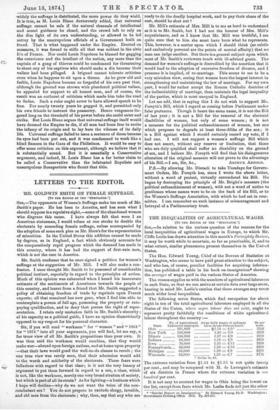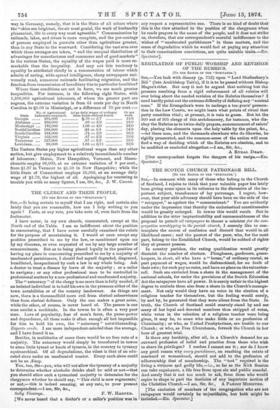THE INEQUALITIES OF AGRICULTURAL WAGES. [TO TEE EDITOR OF THE
" SPEC/TATOU.") relation to the curious question of the reasons for the
local inequalities of agricultural wages in Europe, to which Mr. Cliffe Leslie has drawn attention in this month's Fortnightly Review,
it may be worth while to ascertain, so far as practicable, if, and to what extent, similar phenomena present themselves in the United States.
The Hon. Edward Young, Chief of the Bureau of Statistics at Washington, who seems to have paid great attention to the subject, and who has, of course, peculiar facilities for acquiring informa- tion, has published a table in his book on immigration* showing the averages of wages paid in the various States of America.
The census supplies us with the numbers of agricultural labourers in each State, so that we can arrive at certain data over large areas, bearing in mind Mr. Leslie's caution that these averages may cover much wider local inequalities.
The following seven States, which find occupation for about eight in ten of the total agricultural labourers employed in all the States of the Union, where negro labour does not exist, ought to represent pretty faithfully the conditions of white agricultural labour throughout the country :—
No. of Agricultural Mega daily wages of ordinary Or per State. Labourers employed. farm bands without board. week.
Ohio 191,000 $1.14 — 4/3' 25/6 New York ... 135,000 1.36 — 5/0 30/0 Illinois 134,000 1.27 — 4/8 28/0 Indiana 84,000 1.18 — 4/5 26/6 Iowa 70,000 1.35 — 4/11 29/6 Pennsylvania... 69,000 1.32 — 4/10 29/0 Michigan 65,000 1.29 — 4/9 28/6 Wisconsin 52,000 1.25 — 4/7 27/6
I Dollar 3s. 8d.
The extreme variation from $1.14 to $1.36 is not quite twenty per cent., and may be compared with M. de Lavergne's estimate of six districts in France where the extreme variation is one hundred per cent.
It is not easy to account for wages in Ohio being the lowest on the list, except from facts which Mr. Leslie finds tell just the other Washington:
way in Germany, namely, that it is the State of all others where the "skies are brightest, the air most genial, the work of husbandry pleasantest, life in every way most agreeable." Communication by railroads, lakes, and rivers is more complete, and the per-centage of persons employed in pursuits other than agriculture greater, than in any State to the westward. Considering the vast area over which these averages are taken, "and the unequal distribution of advantages for manufactures and commerce and of good markets" in the variotta States, the equality of the wages paid is more re- markable than the inequality. And may not this tendency to equality be attributed chiefly to a remuneration of labour which admits of saving, wide-spread intelligence, cheap newspapers uni- versally read, numerous railroads facilitating migration, and the freedom from transmission of hereditary ties to particular localities?
Where these conditions are not in force, we see much greater inequalities. For instance, in the following eight States, with 1,386,000 agricultural labourers, of whom the greater part are negroes, the extreme variation is from 64 cents per day in North Carolina to $1.08 in Mississippi, or a difference of 70 per cent. :—
No. of Agricultural State. Labourers employed, Av'ge daily wages of ordinary farm hands without board. Or per week.
Georgia 265,000
$.70 — 2/7
15/6 Alabama 208,000 .80 — 3)0 18/0 Mississippi ... 182,000 1.08 — 4/0 24/0 NorthCarolina 169,000 .64 = 2/1 ... ..... ... 14/0 SouthCarolina 161,000 .74 — 2/9 1616 Virginia 163,000 .87 — 313 19/6 Tennessee ... 137,000 .87 — 3/3 19/6 Louisiana 98,000 1.05 — 3/11 23/6 The Eastern States pay higher agricultural wages than any other section, but give employment to a relatively inconsiderable number of labourers : Maine, New Hampshire, Vermont, and Massa- chusetts employ 96,000, at an extreme variation of 9 per cent., from $1.37 in Vermont to $1.50 in New Hampshire ; while the little State of Connecticut employs 19,000, at an average daily wage of $1.79, the highest of all. Apologising for venturing to trouble you with so many figures, I am, Sir, &c., J. W. CROSS.



































 Previous page
Previous page